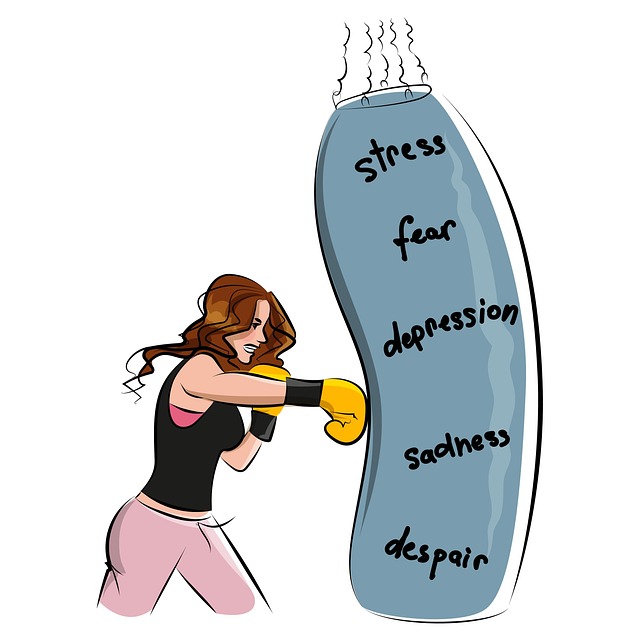Burnout among healthcare providers is a significant concern, impacting job satisfaction, patient care quality, and provider health. Early signs include irritability, cynicism, sleep disturbances, and changes in appetite. Prevention strategies involve self-awareness exercises, stress reduction techniques, and Broomfield Anger Management Therapy (BAMT), which teaches emotional healing, trigger identification, and coping mechanisms to manage anger and frustration. BAMT focuses on individual strength development, helping medical professionals improve patient care, increase job satisfaction, and maintain a healthier work-life balance, thereby mitigating burnout in demanding healthcare settings. Integrating mood management techniques like mindfulness and BAMT into professional development programs enhances resilience and compassion in interactions.
Healthcare provider burnout is a growing concern, yet preventable. This article equips you with essential tools to recognize and combat burnout early on. We explore ‘Broomfield Anger Management Therapy’—a unique approach enhancing resilience. Additionally, discover comprehensive strategies promoting a healthy work-life balance crucial for well-being and sustained career satisfaction. Implement these tactics to foster a fulfilling professional journey.
- Recognizing Burnout: Early Signs and Symptoms
- Broomfield Anger Management Therapy: A Potent Tool for Resilience
- Comprehensive Strategies to Foster a Healthy Work-Life Balance
Recognizing Burnout: Early Signs and Symptoms

Burnout is a state of emotional, physical, and mental exhaustion caused by prolonged or excessive stress. For healthcare providers, burnout can lead to decreased job satisfaction, reduced patient care quality, and potential health risks. Recognizing the early signs and symptoms is crucial for timely intervention. Common indicators include increased irritability, frequent feelings of cynicism or detachment from work, and a decline in professional effectiveness. Healthcare workers might also experience insomnia, changes in appetite, and a sense of constant fatigue that doesn’t improve with rest.
Self-awareness exercises can play a pivotal role in identifying these signs early on. Techniques such as journaling and meditation promote emotional intelligence, enabling professionals to better understand their reactions to stressful situations. Stress reduction methods like regular physical activity, proper time management, and setting clear boundaries between personal and professional life are also essential tools in burnout prevention. Broomfield Anger Management Therapy, for instance, offers strategies to manage intense emotions and prevent impulsive behaviors that can exacerbate stress levels.
Broomfield Anger Management Therapy: A Potent Tool for Resilience

Broomfield Anger Management Therapy (BAMT) has emerged as a powerful tool in the arsenal against healthcare provider burnout. By focusing on emotional healing processes, BAMT equips medical professionals with strategies to manage and reduce anger, stress, and frustration—common symptoms of burnout. Through this therapy, healthcare workers learn to identify triggers, develop coping mechanisms, and enhance their ability to respond calmly under pressure, fostering a greater sense of resilience.
This approach goes beyond the traditional Mental Health Policy Analysis and Advocacy by addressing the individual’s inner strength development. By mastering anger management skills, healthcare providers can improve patient care, boost job satisfaction, and maintain a healthier work-life balance. BAMT offers a proactive solution, emphasizing the importance of self-care and emotional well-being as fundamental aspects of preventing burnout in demanding healthcare environments.
Comprehensive Strategies to Foster a Healthy Work-Life Balance

In today’s fast-paced healthcare environment, fostering a healthy work-life balance is crucial to preventing burnout among providers. Comprehensive strategies should encompass both individual and organizational levels. For instance, encouraging medical professionals to adopt a structured self-care routine development for better mental health can significantly enhance their resilience. This includes dedicated time for hobbies, exercise, and adequate sleep, which are essential components of stress management workshops within the organization.
Additionally, integrating mood management techniques, such as mindfulness or Broomfield Anger Management Therapy, into professional development programs can empower healthcare providers to handle high-stress situations more effectively. These practices not only contribute to improved job satisfaction but also enhance patient care by ensuring that medical professionals are emotionally equipped to interact with patients and colleagues in a compassionate and focused manner.
In addressing healthcare provider burnout, recognizing early signs and implementing effective strategies like Broomfield Anger Management Therapy is key. This therapy offers a potent tool for resilience, enabling professionals to navigate the challenges of their demanding professions with greater equanimity. By adopting comprehensive approaches to foster a healthy work-life balance, healthcare providers can prevent burnout and maintain the high level of care essential to their patients’ well-being.














